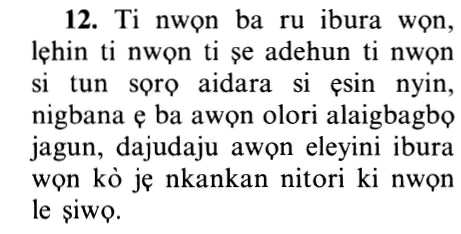9vs12
Select any filter and click on Go! to see results
وَإِن نَّكَثُواْ أَيْمَانَهُم مِّن بَعْدِ عَهْدِهِمْ وَطَعَنُواْ فِي دِينِكُمْ فَقَاتِلُواْ أَئِمَّةَ الْكُفْرِ إِنَّهُمْ لاَ أَيْمَانَ لَهُمْ لَعَلَّهُمْ يَنتَهُونَ
Wain nakathoo aymanahum min baAAdi AAahdihim wataAAanoo fee deenikum faqatiloo aimmata alkufri innahum la aymana lahum laAAallahum yantahoona
Index Terms
Click to play
Yoruba Translation

Hausa Translation
Kuma idan suka warware rantsuwõyin amãna daga bãyan alkawarinsu, kuma suka yi sũka a cikin addininku, to, ku yaki shũgabannin kãfirci. Lalle ne sũ, bãbu rantsuwõyin amãna a gare su. Tsammãninsu sunã hanuwa.
Asbabu n-Nuzuul (Occasions of Revelation)
(And if they break their pledges after their treaty (hath been made with you) and assail your religion, then fight the heads of disbeliefナ) [9:12]. Said Ibn Abbas: モThis verse was revealed about Abu Sufyan ibn Harb, al-Harith ibn Hisham, Suhayl ibn Amr, Ikrimah ibn Abi Jahl and all the chiefs of Quraysh who broke their
pledges, and these are the ones who planned to expel the Messenger of Allahヤ.
The Oaths of the Leaders of Disbelief mean nothing to Them
Allah says,
وَإِن نَّكَثُواْ أَيْمَانَهُم مِّن بَعْدِ عَهْدِهِمْ ...
But if they violate their oaths after their covenant,
Allah says, if the idolators with whom you conducted peace treaties for an appointed term break
أَيْمَانَهُم (their oaths),
meaning, terms of their treaties, and covenants.
... وَطَعَنُواْ فِي دِينِكُمْ ...
and attack your religion...
with disapproval and criticism, it is because of this that one who curses the Messenger, peace be upon him, or attacks the religion of Islam by way of criticism and disapproval, they are to be fought.
This is why Allah said afterwards,
... فَقَاتِلُواْ أَئِمَّةَ الْكُفْرِ إِنَّهُمْ لاَ أَيْمَانَ لَهُمْ لَعَلَّهُمْ يَنتَهُونَ ﴿١٢﴾
then fight (you) against the leaders of disbelief -- for surely, their oaths are nothing to them -- so that they may stop.
so that they may refrain from the disbelief, rebellion and the transgression they indulge in.
Qatadah and others said that;
the leaders of disbelief were Abu Jahl, Utbah and Shaybah, Umayyah bin Khalaf, and he went on to mention several others.
Al-A`mash narrated from Zayd bin Wahb from Hudhayfah;
"The people of this Ayah were never fought again.''
A similar statement was reported from Ali bin Abi Talib, may Allah be pleased with him.
However, this Ayah is general, even though the specific reason behind revealing it was the idolators of Quraysh. So this Ayah generally applies to them and others as well, Allah knows best.
Al-Walid bin Muslim said that Safwan bin `Amr narrated that Abdur-Rahman bin Jubayr bin Nufayr said that when Abu Bakr sent an army to Ash-Sham, he advised them,
"You will find some people with shaved heads. Therefore, strike the swords upon the parts that contain the devil, for by Allah, it is better to me to kill one of these people than to kill seventy other men. This is because Allah said, فَقَاتِلُواْ أَئِمَّةَ الْكُفْر (then fight (you) against the leaders of disbelief).''
Ibn Abi Hatim collected it.
يقول تعالى " وإن نكث " هؤلاء المشركون الذين عاهدتموهم على مدة معينة أيمانهم أي عهودهم ومواثيقهم " وطعنوا في دينكم " أي عابوه وانتقصوه ومن ههنا أخذ قتل من سب الرسول صلوات الله وسلامه عليه أو من طعن في دين الإسلام أو ذكره بنقص ولهذا قال : " فقاتلوا أئمة الكفر إنهم لا أيمان لهم لعلهم ينتهون " أي يرجعون عما هم فيه من الكفر والعناد والضلال وقد قال قتادة وغيره : أئمة الكفر كأبي جهل وعتبة وشيبة وأمية بن خلف وعدد رجالا وعن مصعب بن سعد بن أبي وقاص قال : مر سعيد بن أبي وقاص برجل من الخوارج فقال الخارجي : هذا من أئمة الكفر فقال سعد : كذبت بل أنا قاتلت أئمة الكفر رواه ابن مردويه وقال الأعمش عن زيد بن وهب عن حذيفة أنه قال : ما قوتل أهل هذه الآية بعد وروي عن علي بن أبي طالب رضي الله عنه مثله والصحيح أن الآية عامة وإن كان سبب نزولها مشركي قريش فهي عامة لهم ولغيرهم والله أعلم وقال الوليد بن مسلم : حدثنا صفوان بن عمرو عن عبد الرحمن بن جبير بن نفير أنه كان في عهد أبي بكر رضي الله عنه إلى الناس حين وجههم إلى الشام قال إنكم ستجدون قوما مجوفة رءوسهم فاضربوا معاقد الشيطان منهم بالسيوف فوالله لأن أقتل رجلا منهم أحب إلي من أن أقتل سبعين من غيرهم وذلك بأن الله يقول " فقاتلوا أئمة الكفر " رواه ابن أبي حاتم .
"وإن نكثوا" نقضوا "أيمانهم" مواثيقهم "من بعد عهدهم وطعنوا في دينكم" عابوه "فقاتلوا أئمة الكفر" رؤساءه فيه وضع الظاهر موضع المضمر "إنهم لا أيمان" عهود "لهم" وفي قراءة بالكسر "لعلهم ينتهون" عن الكفر
النكث النقض , وأصله في كل ما فتل ثم حل . فهي في الأيمان والعهود مستعارة . قال : وإن حلفت لا ينقض النأي عهدها فليس لمخضوب البنان يمين أي عهد .
I'raab - grammatical analysis of the Qur'an
«وَإِنْ نَكَثُوا» إن شرطية وفعل ماض وفاعله وهو في محل جزم فعل الشرط.
«أَيْمانَهُمْ» مفعوله.
«مِنْ بَعْدِ» متعلقان بمحذوف حال من أيمانهم.
«عَهْدِهِمْ» مضاف إليه.
«وَطَعَنُوا» فعل ماض وفاعل.
«فِي دِينِكُمْ» متعلقان بالفعل والجملة معطوفة.
«فَقاتِلُوا أَئِمَّةَ الْكُفْرِ» الفاء رابطة والجملة في محل جزم جواب الشرط.
«إِنَّهُمْ» إن والهاء اسمها.
«لا أَيْمانَ» لا نافية للجنس.
«أَيْمانَ» اسمها مبني على الفتح.
«لَهُمْ» متعلقان بمحذوف خبر. والجملة في محل رفع خبر إن.
«لَعَلَّهُمْ» لعل واسمها وجملة «يَنْتَهُونَ» خبرها والجملة الاسمية لعلهم .. تعليلية لا محل لها.
